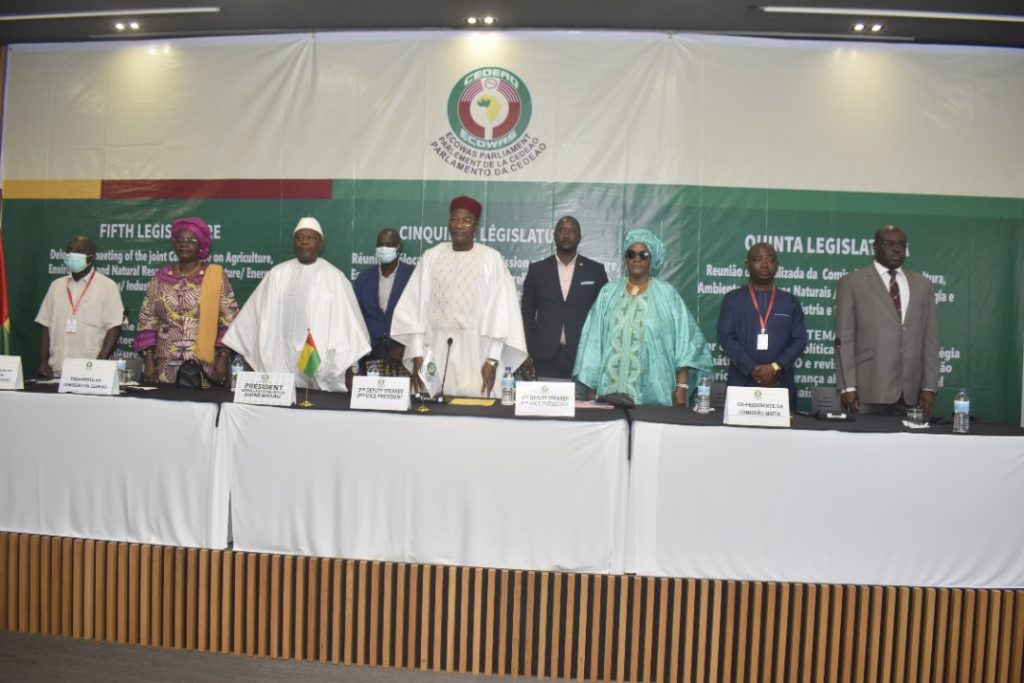Joint Committee of Parliament to scrutinize impact of ECOWAS Environmental Policy on agricultural production
A joint Committee of the Parliament of the Economic Community of West African States (ECOWAS) will hold a delocalised meeting on the theme: ““A Critical look at the ECOWAS Environment Policy and Climate Strategy; together with the Biennial Review of Agriculture, Food and Nutrition Security by Member Countries”, from 23 to 27 August 2022 in Bissau, the capital of the Guinea Bissau. Four of Parliament’s fourteen standing Committees, comprising the following: Committees on Agriculture, environment and natural resources / Infrastructure/ Energy and Mines / Industry and private sector were constituted as a Joint Committee and charged with executing this very important oversight activity on the outlined community policy.
The main objective of the delocalized committee meeting is for Members of the Joint Committee to have an in-depth knowledge and understanding of the ECOWAS Regional Climate Strategy and the Biennial Review process of agricultural production, food, and nutrition security in the region, with a view to facilitating parliamentary deliberations on budgeting for environmental and agricultural programmes as well as to equip Members in carrying out oversight functions over programmes and activities of ECOWAS as mandated by the Supplementary Act on the Enhancement of the Powers of the Parliament (2016). Ordinarily, West Africa is faced with varied environmental challenges which hamper its social and economic development. These environmental issues are exacerbated by the climate change phenomenon, the effects and impacts of which are considerable on agricultural production.
The Comprehensive Africa Agriculture Development Program (CAADP) was launched in 2003 with the aim of reversing these trends. In 2005, ECOWAS launched its agriculture policy – the ECOWAP – which builds on the CAADP and became known as ECOWAP/CAADP. This programme established an annual review and emphasized the key role of the agricultural sector working groups in achieving set objectives. Similarly, Member States were tasked with developing National Agricultural Investment Plans (NAIPs) as part of implementing the ECOWAP within Member States. Nonetheless, a review of recent trends confirms that NAIPs, biennial reviews and agricultural sector working groups are essential to achieving substantial improvements in agricultural production, food security and nutrition in the sub-region.
It is against the above background that Members of the Joint Committee will be sensitized on recent developments and the role these three mechanisms play in bolstering the sector, by resource persons and stakeholders drawn largely from relevant technical directorates of the ECOWAS Commission charged with developing and monitoring the execution of these programmes as well as relevant Ministries in the host Member State charged with implementing both Environmental and Agricultural policies. Additionally, the organized civil society with focus on the subject matter and environmental and agricultural experts, specialists or consultants will also make presentations to the Joint Committee so that it is equipped with all-round perspectives on the subject.
The ECOWAS Parliament has 115 seats and fourteen Standing Committees. Each Member State is guaranteed a minimum of allotted five seats. The remaining forty seats are distributed in proportion to the population of each country. Consequently, Nigeria has a total of 35 seats followed by Ghana with eight seats. Côte d’Ivoire is allotted seven seats, whereas Burkina Faso, Guinea, Mali, Niger and Senegal have six seats respectively. The remaining ECOWAS Member States, namely Benin, Cabo Verde, The Gambia, Guinea Bissau, Liberia, Sierra Leone and Togo, have allotted to each of them five seats.



